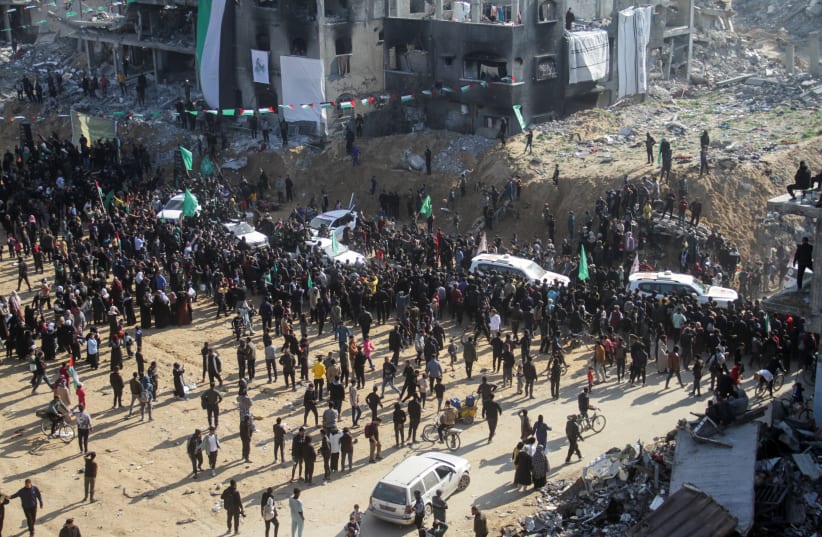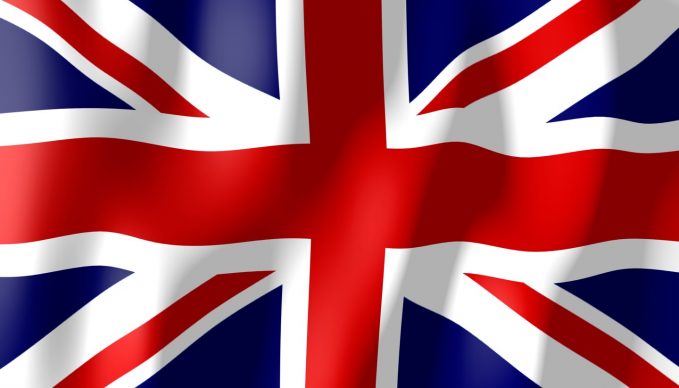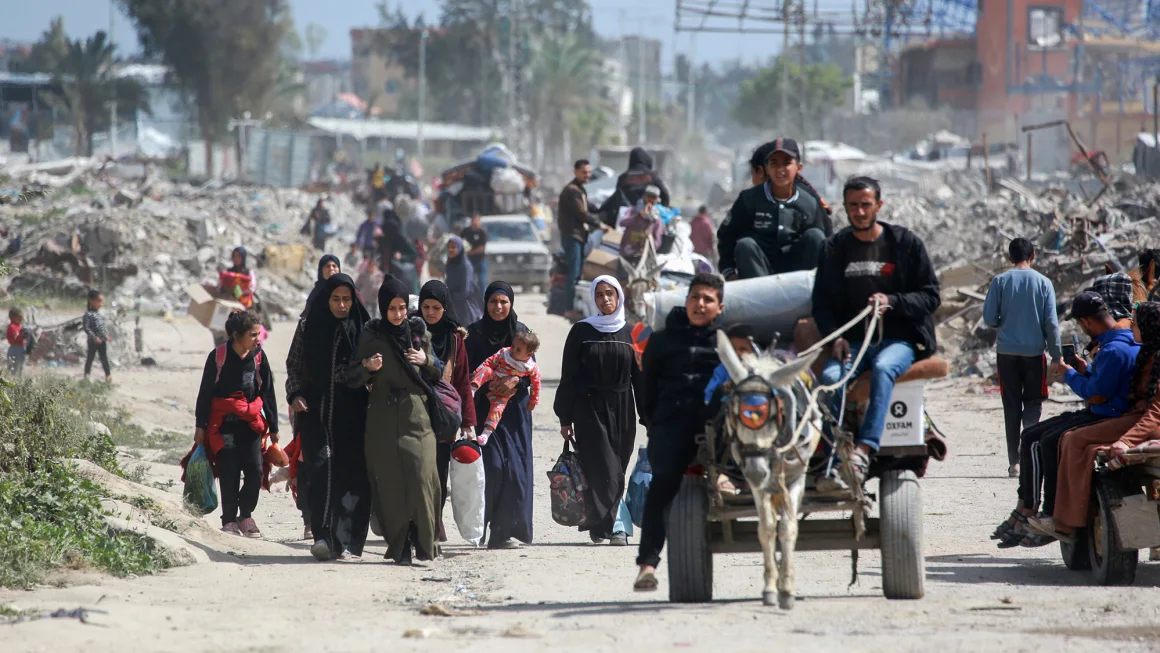Foreign
Hezbollah seeks to stoke tensions with Israel over Ghajar – Analysis

Lebanese politicians have the opportunity to show how “patriotic” they each are by claiming to demand something they didn’t care about a few months ago.

Hezbollah and other political ideologies in Lebanon are looking to stoke a crisis with Israel over the northern border. They are focusing on several areas, including Mount Dov, where Hezbollah set up tents over the past few months, and the Alawite-Arab village of Ghajar, which straddles the border between Lebanon and the Golan Heights.

In each case, the goal is to create tensions over a largely immaterial issue, and then, once the crisis exists, to call it a redline for potential conflict in a bid for concessions. Hezbollah has learned over the years that this strategy works, and for example, it sought to control parts of the maritime deal.
Over the weekend in Ghajar, one of the hotspots, there appeared to be no evidence of tensions in the air. Tourists could be seen in the town, which recently reopened to tourists after many years of being closed. Restaurants offered home-cooked meals, and food trucks awaited customers.
At the entrance to the Ghajar, an IDF soldier sat inside a concrete guard house. Nearby, outside Metulla, UN forces conducted a sweep of an area near a stream that leads to Nahal Ayun. A Palestinian flag lay in tatters on a hill near the border in Lebanon, clearly having not been replaced for a while. But tensions grow behind the scenes of these quaint towns, and they are being stoked by Hezbollah.
According to a proposal that was put forth by the US to Israel, in exchange for Hezbollah withdrawing its tents, Israel would stop the construction of a barrier, Channel 12 reported Monday.
Hezbollah raised Ghajar as an issue recently, claiming Israel’s creation of any kind of barrier or fence is effectively a land grab. The terrorist group raised this as an example, similar to its claims on Mount Dov, as a reason to create a cause for tensions.
Hezbollah will do what it can to manufacture issues and create tensions.
Mount Dov also had Hezbollah tents. What Hezbollah is doing is creating two separate issues that it may then try to link together – Ghajar to Mount Dov – and then taking existing disputes that may go back 23 years to when Israel left Lebanon in 2000 to create artificial tensions.
According to reports, Lebanese Prime Minister Najib Mikati met with UNIFIL and conducted talks with Commander Aroldo Lazaro. Israel’s goal is to get the tents out of its territory. Lebanon wants Israel to pull back from Ghajar.So far, Israel has been cautious and has worked with relevant organizations, such as the UN. But Lebanon appears to be pushing this.
Lebanon currently lacks a president, something that may be a welcome distraction for Lebanese politicians to each show how “patriotic” they can be by staking demands on things unheard of until a few months ago.Israel is a convenient cause to rally around.
“Change MPs Melhem Khalaf, Najat Aoun, Elias Jradi and Firas Hamdan will head Sunday to the Ghajar village that is besieged by the Israeli enemy,” a Lebanese media outlet reported.
“Hezbollah denounced Israel for building a concrete wall around Ghajar, calling on the Lebanese state to take action to ‘prevent the consolidation of this occupation’ by Israel of Ghajar, home to around 3,000 people,” the report said.
According to Naharnet, a Lebanese news site, the “so-called Blue Line cuts through Ghajar, formally placing its northern part in Lebanon and its southern part in the Israeli-occupied and annexed Golan Heights. The residents of Ghajar have been granted Israeli citizenship rights, and Israel has recently opened the town, long a military zone, to tourism.”
Lebanon is trying to pressure Israel over this. According to reports, Lebanese activists want their citizens to be able to enter Ghajar, which would pose a security problem for Israel and clearly is meant as a kind of provocation, a demand that won’t be met.
The Lebanese Foreign Ministry was “following with interest” this issue, the Arab48 news site reported.
Al Mayadeen, a Beirut-based pan-Arabist satellite news television station that is considered pro-Iranian, reported that Lebanon had not acted in the past to “restore” neither Ghajar, nor other villages taken from Lebanon in the 1920s. The issue “returned to the forefront of attention after Hezbollah’s statement, in which it warned of the danger of aggressive measures, [and] can be considered an indication of the Lebanese state’s abuse of Lebanon’s southern borders,” the report said.
Hezbollah is trying to ride this issue. Russia’s Sputnik also took up the cause on its Arabic news site, claiming that
Lebanese politicians “explained that the vast majority of representatives, who represent the broadest group of citizens, adopt the same position, which indicates the correctness and eligibility of the issue and everyone’s commitment to the necessity of imposing state authority on all its lands.”
This is now both a cause célèbre and casus belli for Lebanon and Hezbollah. As with the maritime issue, they work in concert to create new demands and then claim that if the demands are not met, they have the right to tensions.
Hezbollah has already done this through its tents on Mount Dov, creating facts on the ground and a kind of legitimized institutional presence to then “return” to if they are removed.
Hezbollah is trying to ride this issue. Russia’s Sputnik also took up the cause on its Arabic news site, claiming that
Lebanese politicians “explained that the vast majority of representatives, who represent the broadest group of citizens, adopt the same position, which indicates the correctness and eligibility of the issue and everyone’s commitment to the necessity of imposing state authority on all its lands.”
This is now both a cause célèbre and casus belli for Lebanon and Hezbollah. As with the maritime issue, they work in concert to create new demands and then claim that if the demands are not met, they have the right to tensions.
Hezbollah has already done this through its tents on Mount Dov, creating facts on the ground and a kind of legitimized institutional presence to then “return” to if they are removed.

Foreign
Hamas claims spokesperson killed in Israeli strike on northern Gaza

Earlier this week, Israel killed Ismail Barhoum, a member of Hamas’ political office, and Salah al-Bardaweel, another senior leader.

Hamas spokesman Abdel Latif al-Qanou was allegedly killed in an Israeli airstrike on northern Gaza, Hamas-affiliated news agency Shehab reported on Wednesday night.

Al-Qanoa was one of Hamas’s most prominent spokesmen in Gaza, and while he avoided media appearances during the months of fighting, he gave multiple interviews to Arab news channels after the ceasefire.
Al-Qanoua was killed when his tent was targeted in Jabaliya, the Hamas-run Al-Aqsa television reported. The same strike wounded several people, medical sources said.
Earlier this week, Israel killed Ismail Barhoum, a member of Hamas’ political office, and Salah al-Bardaweel, another senior leader.
Both Bardaweel and Barhoum were members of the 20-member Hamas decision-making body, the political office, 11 of whom have been killed since the start of the war in late 2023, according to Hamas sources.
Tents for Palestinians seeking refuge are set up on the grounds of a United Nations Relief and Works Agency for Palestine Refugees (UNRWA) centre in Khan Yunis in the southern Gaza Strip on October 19, 2023, amid the ongoing battles between Israel and the Palestinian group Hamas (credit: MAHMUD HAMS/AFP via Getty Images)
The IDF has yet to comment on the alleged elimination.
Increased IDF pressure in the Gaza Strip
Since fighting in Gaza was renewed at the beginning of last week, the IDF has killed 150 terrorists, including 10 top Hamas officials, The Jerusalem Post learned Tuesday.
In certain areas, the military has entered a full kilometer into Gaza, such as around the Nitzanim Corridor in central Gaza.
In addition to central Gaza, Beit Lahia, Beit Hanoun, parts of Khan Yunis, Shaboura, and Tel Sultan, the IDF has been evacuating and moving into Jabaliya.

Foreign
Dead Nigerians, Africans, others without will may lose unclaimed estates in UK

Hundreds of unclaimed estates reveal untold stories of African migration, wealth, and family ties left behind.
Thousands of people die every year in the United Kingdom without leaving a will or identifying next of kin, and among them are many Nigerians and other Africans whose estates—ranging from property to savings—remain unclaimed.
The UK government’s latest list of unclaimed estates, updated daily, includes over 170 entries connected to African-born individuals, with Nigerians making up a significant portion of the cases.

A Legacy Lost
For many migrants, the UK became a home away from home—a land of opportunity where they built wealth, purchased property, and created a life.

However, the absence of a will often results in their assets being classified as “bona vacantia” (ownerless goods), leaving them to the custody of the Crown.
Families back in Africa are frequently unaware of these estates, leading to a permanent loss of assets.
Cases like that of Adenike Adebiyi, who passed away in Hackney, London, in 2004, or Solomon Adekanmibi, who died in Colchester, Essex, in 2021, highlight the consequences of dying intestate.
With no identified next of kin or missing documentation, their estates remain unclaimed, and their legacies risk being forgotten.
Why It Matters
This phenomenon underscores a critical issue: many African families are unaware of their relatives’ financial situations abroad.
Migration often disrupts communication, and without clear documentation, the wealth built overseas remains beyond reach.
The loss isn’t just financial—it’s deeply cultural and emotional. Unclaimed estates represent untold family histories, connections, and the struggles of migrants who built their lives in the diaspora.
The Challenges
Lack of Awareness:
Most families in Nigeria and other African countries are unaware of their relatives’ estates abroad or how to access them.
Genealogical Gaps:
The information provided in official records is often incomplete. For example, many entries in the UK unclaimed estates list lack detailed family history or next-of-kin information.
Cultural Hesitations:
In many African cultures, discussing death and wills is considered taboo, leading to reluctance in planning for asset distribution.
A Call to Action
African governments, community organizations, and legal professionals need to raise awareness about this issue.
Here’s what can be done:
Encouraging Will Writing: Migrants in the diaspora should be educated about the importance of drafting wills to protect their assets.
Genealogical Support: Families in Africa can be assisted in tracing unclaimed estates through local or international partnerships.
Public Awareness Campaigns: Social and traditional media can highlight the importance of estate planning and share resources for families.
How to Check the List
The UK government maintains a public Unclaimed Estates List that is updated daily.
Families can search the list by name, place of birth, or other identifiers to check for potential claims.
Final Thoughts
For many Nigerians and Africans in the UK, their unclaimed estates represent more than just wealth—it’s a story of migration, resilience, and identity.
By addressing this growing issue, families can reclaim their heritage, and the legacy of those who journeyed to the diaspora need not be forgotten.
Here is the latest daily update as of March 24, 2025. Check the list

Foreign
Israel approves controversial proposal to facilitate emigration of Palestinians from Gaza

Israel’s security cabinet has approved a controversial proposal to facilitate Palestinian emigration from Gaza, a move critics warn could amount to ethnic cleansing.

Israeli Finance Minister Bezalel Smotrich on Sunday said the security cabinet approved the proposal by Defense Minister Israel Katz to organize “a voluntary transfer for Gaza residents who express interest in moving to third countries, in accordance with Israeli and international law, and following the vision of US President Donald Trump.”

The decision marks a remarkable endorsement of a plan once considered a far-right fantasy – and comes despite the prime minister’s earlier pledge not to permanently displace Gaza’s civilian population.
Critics have said that any mass displacement of Gazans in the midst of a devastating war would amount to ethnic cleansing, an act associated with war crimes and crimes against humanity under international law. Israeli officials have countered that emigration would be voluntary and in line with international legal standards.
But aid groups argue that Israel’s war has made life in Gaza nearly impossible. Martin Griffiths, the United Nations’ top emergency relief official, has called the enclave “uninhabitable,” saying its people are “witnessing daily threats to their very existence.”
The Israeli approval would establish an administration within the defense ministry “to prepare and facilitate the safe and controlled movement of Gaza residents who wish to voluntarily move to third countries,” according to a statement from the defense ministry.
Its work would include “establishing movement routes, pedestrian checks at designated crossings in the Gaza Strip,” and infrastructure to enable people to leave.
Israeli officials have presented the plan as a fulfillment of a desire by Trump to take over Gaza, expel its Palestinian population to neighboring countries and turn it into a Middle Eastern “riviera.”
The Palestinian Authority’s Minister of State for Foreign Affairs Varsen Aghabekian Shaheen told CNN’s Becky Anderson last month that Palestinians “are steadfast to stay in their land and will not move.”
Trump’s ‘vision’
Katz said Sunday that Israel is using “all means to implement the vision of the US president,” according to the defense ministry statement.
This month, Trump appeared to backtrack on his comments about displacing Palestinians, telling reporters that “nobody is expelling any Palestinians.” Steve Witkoff, the US special envoy to the Middle East, said last month that the US initiative to rebuild Gaza won’t necessarily amount to an “eviction plan” and that it was designed to “shake up everybody’s thinking.”
Last year, Israeli Prime Minister Benjamin Netanyahu said his country had no intention to displace Palestinians or occupy Gaza.
Related articleTrump says ‘nobody is expelling Palestinians,’ weeks after saying they should be moved to Arab states
“I want to make a few points absolutely clear: Israel has no intention of permanently occupying Gaza or displacing its civilian population,” Netanyahu said in a video statement in January 2024.
Trump’s proposal has, however, brought the idea further into the mainstream, with Israeli politicians now openly discussing mass emigration of Gazans as a solution to the war. And Katz last week said that Israel may maintain a permanent presence in the enclave.
Israeli rights group Peace Now criticized the plan, saying “the establishment of the administration to expel Palestinians from Gaza is one of the stupidest moves by a government that has lost all direction and logical thinking.”
The prospect has also drawn sharp rebuke from Arab leaders, especially Egypt and Jordan, who would be expected to absorb the large number of expelled Palestinians. Experts have also warned that displacing Palestinians would further destabilize the region and threaten the security of neighboring states.
Smotrich said Sunday that the security cabinet also approved the expansion of Jewish settlements in the occupied West Bank, noting that 13 areas in the West Bank would be split from existing settlements and would be recognized as independent settlements.
“Instead of hiding and apologizing – we are raising the flag, building, and settling. This is another important step on the path to actual sovereignty in Judea and Samaria,” he said, using the name by which Israelis refer to the West Bank.
The Yesha Council, an umbrella body representing Jewish settlements, said that as of January 2024, there were 150 settlements in the West Bank.
It said that the decision exposes a “long-standing lie that (Israel) does not establish new settlements, but only ‘neighborhoods’ of existing settlements” and that it is “another nail in the coffin that the Government of Israel is preparing for the only chance for a future of peace and security.”
A statement sent by Smotrich’s office said the move comes against “the backdrop of the approval of tens of thousands of housing units in Judea and Samaria and represents another significant step in the process of normalizing and regulating the settlement.”
Smotrich and other right-wing ministers have been pushing an aggressive expansion of settlements on the path to declaring Israeli sovereignty over the West Bank, which would be in defiance of international law and UN Security Council resolutions.
Israel says it will maintain ‘permanent’ presence in Gaza unless hostages are freed

-

 Politics1 week ago
Politics1 week agoOpposition leaders announce coalition to challenge Tinubu in 2027
-

 Foreign1 week ago
Foreign1 week agoHouthis declare Ben-Gurion Airport ‘no longer safe’ after renewed Gaza fighting
-

 Politics1 week ago
Politics1 week agoYahaya Bello deceptively arranging recall of Senator Natasha, desperate to replace her – Constituents
-

 News1 week ago
News1 week agoWhy Christ Embassy’s Pastor Chris holds Abuja mega crusade – Fisho
-

 Crime1 week ago
Crime1 week agoGhana’s anti-drug agency nabs Nigerian drug kingpin, Uchechukwu Chima, seizes $2.1m worth of cocaine, heroin
-

 News1 week ago
News1 week agoUmeh denies receiving $10,000 with other 42 Senators to support state of emergency in Rivers
-

 Politics1 week ago
Politics1 week agoAtiku, El-rufai, Obi condemn Tinubu’s suspension of Rivers Governor, demand reversal
-

 Business1 week ago
Business1 week agoFlutterwave, FIRS collaborate to digitize tax collection in Nigeria


















